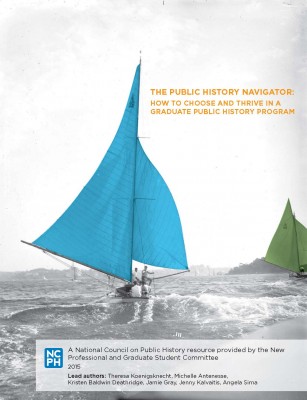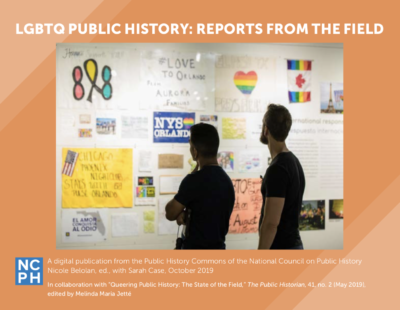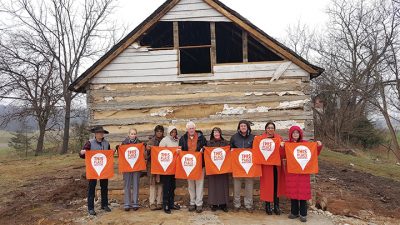DIGITAL PUBLICATIONS
![]() NCPH’s public history blog. The blog was created in March 2012 to create an online space where people from a variety of areas of the public history field could share ideas and news, and to create a bridge to future digital and other publication efforts. Like the field itself, the blog is designed to blend scholarly, professional, and civic discourse arising from the practice of presenting history in public.
NCPH’s public history blog. The blog was created in March 2012 to create an online space where people from a variety of areas of the public history field could share ideas and news, and to create a bridge to future digital and other publication efforts. Like the field itself, the blog is designed to blend scholarly, professional, and civic discourse arising from the practice of presenting history in public.

This guide is a free, international resource for prospective students, public history faculty, and anyone interested in the shape of public history education today. It offers basic information, in a standardized format, about the growing number of public history programs for graduate and undergraduate students. It is meant to be a starting point for comparing programs.
OTHER NCPH PUBLICATIONS AND REPORTS

THE inclusive historian’s handbook
A partnership with the American Association for State and Local History, The Inclusive Historian’s Handbook is a co-sponsored digital resource designed to center inclusivity, diversity, equity, and public service in public history work. The Handbook is a living digital project comprised of entries examining all facets of public history work in the lens of these core values. The project launched in August 2019 with twenty entries, including “Accessibility,” “Civic Engagement,” “Food History,” “Plantations,” “Sexuality,” and more. Entries will continue to be added through 2019 and 2020 for a final first edition of one hundred entries.
Digital Public History Directory
This compilation of resources is for students, professionals, and researchers of all levels to connect to digital projects that focus on the study or interpretation of historical subject matter. All resources are open access and searchable by a variety of filters, including time period, geographic region, subject matter, creator, and more. For those interested in creating digital projects, software, labor, and costs for each project are also included.
THE PUBLIC HISTORY NAVIGATOR
A “consumer’s guide to public history programs” designed to help history undergraduates prepare for, select, and succeed in a graduate public history program. The Navigator also includes links to other online resources that will help undergrads navigate the waters of grad school.
“CAREERS FOR STUDENTS OF HISTORY”
A must read for any student interested in working as a historian. Sponsored by the American Historical Association and NCPH and authored by faculty and students in the Public History Program at the University of South Carolina, the 2002 edition discusses numerous career possibilities. It includes interviews with prominent historians, ranging from those in academic and publishing areas, to public and consulting.
BEST PRACTICES
The NCPH Curriculum and Training Committee is developing “best practices” documents for several key aspects of public history curriculum and program development. Recognizing that each graduate or undergraduate program has its own goals, resources, and needs, we hope these documents will highlight some of the core elements to which every program should aspire.
TENURE AND PROMOTION REPORT
This joint report offering best practices for evaluating public history scholarship in history departments, was adopted by the NCPH, the Organization of American Historians, and the American Historical Association in spring 2010. The report provides clear advice for college and university administrators, department chairs, and faculty. The report is here. A supporting white paper, also written by the committee, is available.
public history employer report and survey
Based on a survey of 401 public history employers, this report surveys trends in public history employment since the 2008 recession. It was compiled by the Joint Task Force on Public History Education and Employment of the American Association for State and Local History, the American Historical Association, the National Council on Public History, and the Organization of American Historians. It identifies skills and knowledge employers consider valuable for entry-level professional positions, what employers look for when hiring for mid-career and senior positions, and skills and expertise that employers see as increasingly important. The report also considers broad trends affecting historical organizations and institutions and recommends steps for public history programs to take to prepare students for post-graduate opportunities and long-term career growth. Finally, the report recommends greater advocacy on the part of national, state, and local historical organizations to combat anti-intellectualism and increase appreciation for historical scholarship and history education.The report is here. A supporting document compiling all of the survey comments is also available here.

LGBTQ Public History: Reports from the Field, Nicole Belolan, ed., with Sarah Case (National Council on Public History, October 2019)
LGBTQ PUBLIC HISTORY: REPORTS FROM THE FIELD
This is a digital publication about the intersection of LGBTQ history and public history that complements the May 2019. LGBTQ-themed issue of The Public Historian, edited by Melinda Marie Jetté. The digital publication features reports from the field. You can read this publication in full as a pdf here.
A digital publication of History@Work and The Public Historian in commemoration of the fiftieth anniversary of the National Historic Preservation Act, October 2016. A compilation of blog posts reflecting on essays published in The Public Historian and some new essays reflecting on the future of the National Historic Preservation Act. This e-book is available as a PDF, and also as an EPUB: preservingplaces
PUBLIC HISTORY IN A CHANGING CLIMATE
 A special publication of the Public History Commons as part of “The State of the Field: Public History and Environmental Sustainability.” A collaborative project of the National Council on Public History and The Public Historian, March 2014
A special publication of the Public History Commons as part of “The State of the Field: Public History and Environmental Sustainability.” A collaborative project of the National Council on Public History and The Public Historian, March 2014
ETHICS
The NCPH Code of Ethics and Professional Conduct was adopted in 2007 to replace a version from 1986. This code sets forth guidelines of professional conduct expected of all members of the NCPH.




